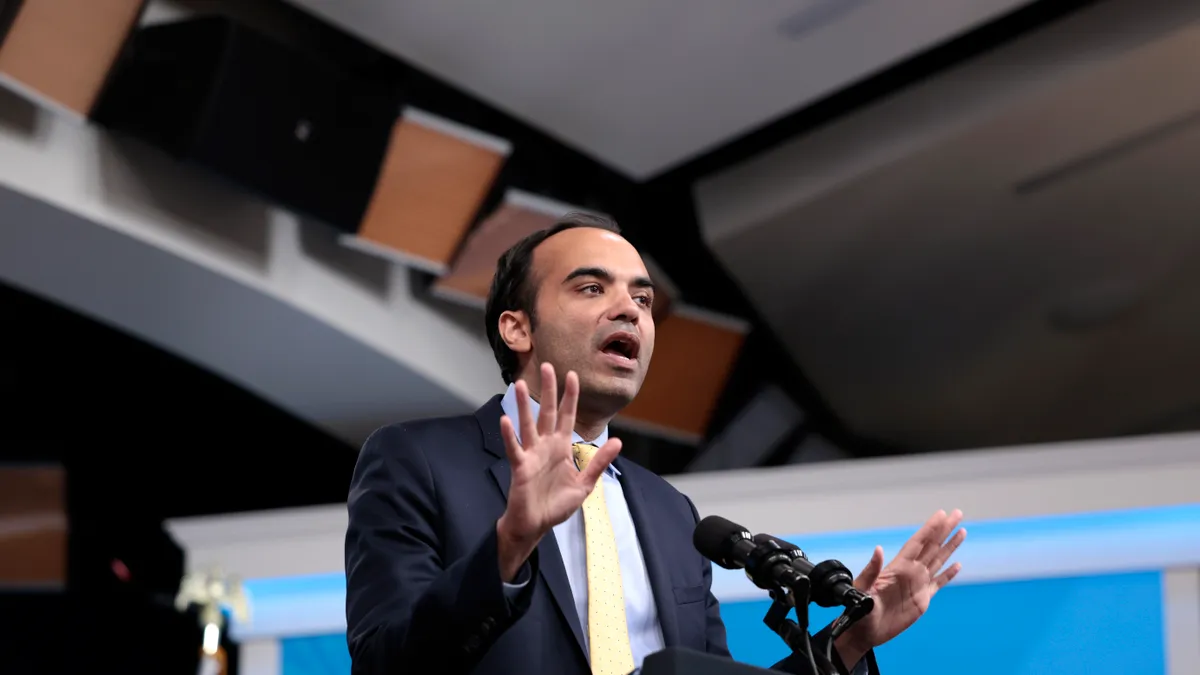Consumer Financial Protection Bureau Director Rohit Chopra has called for a review of the deposit insurance threshold following the failure of a community bank in Oklahoma last month.
While speaking at a closed meeting of the Federal Deposit Insurance Corp. board of directors last week, Chopra, who holds a spot on the board, urged Congress to remove or “dramatically increase” the limits on federal deposit insurance for payroll and other non-interest bearing operating accounts.
On Oct. 18, the Office of the Comptroller of the Currency shut down Oklahoma-based First National Bank of Lindsay, saying the bank was in “an unsafe or unsound condition to transact business” and appointed the FDIC as receiver. The OCC also identified “false and deceptive bank records and other information suggesting fraud that revealed depletion of the bank’s capital.” The FDIC said it would make 50% of uninsured funds available to depositors.
“As a result of the failure, some depositors in this rural area of Oklahoma are expected to take a loss, since their account balances exceeded federal deposit insurance limits,” Chopra said in a statement.
Deposit insurance is integral to the U.S. banking system, but the FDIC deposit insurance cap has not increased since the 2008 financial crisis.
In March 2023, regulators protected uninsured depositors at Silicon Valley Bank and Signature Bank to prevent a potential systemic banking crisis. These banks served large gaming, crypto, media streaming, and venture capital firms, not primarily local businesses. The intervention was deemed necessary because the banks' failures threatened to destabilize the entire banking system, Chopra noted.
“In other words, big businesses putting their money in big banks enjoy free deposit insurance, and small businesses putting their money in small banks don’t. This is fundamentally unfair,” he said. “The status quo gives an unfair competitive advantage to the largest banks in the country.”
Following last year’s bank failures, FDIC Chair Martin Gruenberg called for an analysis of the current deposit insurance framework. The FDIC published options for deposit insurance reform in July 2023, outlining three options — limited, unlimited, and targeted. The report discussed the objectives and possible consequences of deposit insurance and the tools that might help to support the objectives.
That same month last year, Vice President-elect Sen. JD Vance, R-OH, introduced legislation that would grant unlimited deposit insurance to all non-interest bearing transaction accounts – primarily business payroll and operating accounts.
Sen. Tim Scott, R-SC, the Senate Banking Committee’s ranking member, also called for evaluating deposit insurance and scrutinizing the tradeoffs that come with reforming the systems, especially amidst rapidly advancing technology.
However, Gruenberg noted in September 2023 it was unlikely the agency would modify deposit insurance since it requires approval from Congress. Considerable interest in the topic immediately following last year’s bank failures has “dissipated with time,” he said last year.
Rep. French Hill, R-AR, a top contender to lead the House Financial Services Committee, told American Banker last year’s bank failures would “prompt a post-Congressional and financial federal regulatory review of the deposit insurance system.”
During the financial crisis, when the federal government guaranteed all deposits, many predicted that deposits would migrate to large global systemically important banks, Hill added.
Last week, Hill revealed a set of principles to support community banking, which, though did not include deposit insurance guidelines, emphasized the need for small banks to compete with larger financial institutions in a fair marketplace and “to make community banking great again.”
Chopra’s days leading the CFPB might be numbered once Donald Trump’s presidential administration takes over in January.














